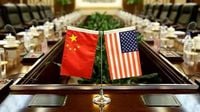On May 2, 2025, tensions between the United States and China regarding trade tariffs reached a new chapter as China announced it is currently "assessing" the proposal for negotiations put forth by the U.S. This revelation came to light through a statement from the Chinese Ministry of Commerce, which indicated that Washington had "actively" sought dialogue on tariff issues.
The spokesperson for the Ministry of Commerce stated, "Recently, the U.S. has actively contacted relevant parties to announce their desire to negotiate with China." However, the spokesperson also emphasized that China has yet to make a final decision on whether to engage in these discussions.
China's position is clear: if the U.S. wishes to negotiate, it must demonstrate sincerity by correcting its previous mistakes, which includes canceling unilateral tariffs and taking concrete actions. The statement further asserted that if the U.S. fails to amend its unilateral tax measures, it would signify a lack of sincerity and would further damage the trust between the two nations.
The backdrop to this diplomatic tension is a trade war that escalated significantly in April 2025. The U.S. imposed a staggering 145% tariff on numerous Chinese products, a move aimed at addressing what it deemed unfair trade practices. In retaliation, China responded with a 125% tariff on U.S. goods.
President Trump, during a press conference on April 30, 2025, expressed optimism about the potential for an agreement, stating, "There is a high possibility that we will reach an agreement." Despite this, China has consistently dismissed claims of ongoing negotiations and has called for a dialogue characterized by fairness, respect, and mutual benefit.
In a recent video posted by the Chinese Ministry of Foreign Affairs, officials reiterated their readiness to continue the trade war if necessary, asserting their resolve with a bold declaration: "We will never kneel!" This statement underscores China's firm stance against what it perceives as aggressive U.S. trade policies.
Additionally, reports suggest that the Chinese government is contemplating temporarily suspending the 125% tariff on certain imported U.S. goods, particularly medical equipment and some industrial chemicals like ethane. This potential concession indicates a willingness to explore avenues for negotiation, albeit under specific conditions.
Following the U.S. tariff hike, which included some products facing taxes as high as 245%, President Trump attempted to ease concerns by indicating that the tariffs could see significant reductions once an agreement is reached. However, he clarified that the tariffs would not return to zero, suggesting a long-term strategy for U.S. trade policy.
As the situation develops, it remains to be seen whether the U.S. will take the necessary steps to demonstrate goodwill, as emphasized by the Chinese spokesperson. The need for concrete actions from Washington is paramount if any meaningful dialogue is to take place.
The trade relationship between the U.S. and China has historically been fraught with challenges, with both nations often engaging in tit-for-tat tariff measures. The current standoff reflects broader geopolitical tensions that extend beyond mere economics, encompassing issues of national security, technology, and global influence.
Experts suggest that the outcome of these negotiations could have far-reaching implications not only for bilateral relations but also for the global economy. As both nations navigate these turbulent waters, the stakes are high, and the international community is watching closely.
Should the U.S. and China find common ground, it could pave the way for a more stable economic relationship. Conversely, continued escalation could lead to further economic strain, not only for the two countries involved but also for their trading partners worldwide.
In summary, the ongoing dialogue regarding tariffs between the U.S. and China is emblematic of larger issues at play in international trade. The need for sincerity and concrete actions from both parties is crucial in determining the future of their economic relationship. As both sides weigh their options, the world waits to see if a resolution can be achieved that benefits all involved.




